Milton’s Universe as interpreted by Homer B. Sprague
Hello and welcome to Episode 21 of Read Paradise Lost with me, Jane Davis, a podcast and Substack newsletter about my project to read all of Paradise Lost by John Milton, aloud, and with a sometimes word-by-word, sometimes line-by-line discussion. This is a one-take recording with no editing, so forgive noise of seagulls, my coughing, or sound of men drilling next door. Rough and ready reading is what you get.
See Episode 1 for an introduction to the project.
Last week we finished at the point where Satan was about to address the Council of Fallen Angels, and we pick up there, reading fifty-five lines this week:
O Progeny of Heav'n, Empyreal Thrones, [ 430 ]
With reason hath deep silence and demurr
Seis'd us, though undismaid: long is the way
And hard, that out of Hell leads up to light;
Our prison strong, this huge convex of Fire,
Outrageous to devour, immures us round [ 435 ]
Ninefold, and gates of burning Adamant
Barr'd over us prohibit all egress.
These past, if any pass, the void profound
Of unessential Night receives him next
Wide gaping, and with utter loss of being [ 440 ]
Threatens him, plung'd in that abortive gulf.
If thence he scape into whatever world,
Or unknown Region, what remains him less
Then unknown dangers and as hard escape.
But I should ill become this Throne, O Peers, [ 445 ]
And this Imperial Sov'ranty, adorn'd
With splendor, arm'd with power, if aught propos'd
And judg'd of public moment, in the shape
Of difficulty or danger could deterr
Mee from attempting. Wherefore do I assume [ 450 ]
These Royalties, and not refuse to Reign,
Refusing to accept as great a share
Of hazard as of honour, due alike
To him who Reigns, and so much to him due
Of hazard more, as he above the rest [ 455 ]
High honourd sits? Go therefore mighty Powers,
Terror of Heav'n, though fall'n; intend at home,
While here shall be our home, what best may ease
The present misery, and render Hell
More tollerable; if there be cure or charm [ 460 ]
To respite or deceive, or slack the pain
Of this ill Mansion: intermit no watch
Against a wakeful Foe, while I abroad
Through all the Coasts of dark destruction seek
Deliverance for us all: this enterprize [ 465 ]
None shall partake with me. Thus saying rose
The Monarch, and prevented all reply,
Prudent, least from his resolution rais'd
Others among the chief might offer now
(Certain to be refus'd) what erst they fear'd; [ 470 ]
And so refus'd might in opinion stand
His Rivals, winning cheap the high repute
Which he through hazard huge must earn. But they
Dreaded not more th' adventure then his voice
Forbidding; and at once with him they rose; [ 475 ]
Thir rising all at once was as the sound
Of Thunder heard remote. Towards him they bend
With awful reverence prone; and as a God
Extoll him equal to the highest in Heav'n:
Nor fail'd they to express how much they prais'd, [ 480 ]
That for the general safety he despis'd
His own: for neither do the Spirits damn'd
Loose all thir vertue; least bad men should boast
Thir specious deeds on earth, which glory excites,
Or clos ambition varnisht o're with zeal. [ 485 ]
Once again I notice that Heaven is the norm, the under-pattern, the true reality for the fallen angels. Satan, addressing his colleagues, calls them ‘Progeny of Heav'n, Empyreal Thrones’. This address seems quite natural to him - that’s to say, I don’t think he is manipulating or flattering his audience by these terms of address. He still thinks of them, and of himself, as ‘of Heaven.’ But as goes on to tell his audience how difficult the task before him is, he is manipulating them. :
With reason hath deep silence and demurr
Seis'd us, though undismaid: long is the way
And hard, that out of Hell leads up to light;
Our prison strong, this huge convex of Fire,
Outrageous to devour, immures us round [ 435 ]
Ninefold, and gates of burning Adamant
Barr'd over us prohibit all egress.
These past, if any pass, the void profound
Of unessential Night receives him next
Wide gaping, and with utter loss of being [ 440 ]
Threatens him, plung'd in that abortive gulf.
If thence he scape into whatever world,
Or unknown Region, what remains him less
Then unknown dangers and as hard escape.
The ‘us’ in line 432 is purely rhetorical - the others are silent but not he isn’t. He is stepping forward to the task, and he can’t stress enough what a tough one it is:
long is the way
And hard, that out of Hell leads up to light;
It may not be possible to leave Hell, and the adventure threatens those who undertake it ‘with utter loss of being’, but he is going to make the attempt:
But I should ill become this Throne, O Peers, [ 445 ]
And this Imperial Sov'ranty, adorn'd
With splendor, arm'd with power, if aught propos'd
And judg'd of public moment, in the shape
Of difficulty or danger could deterr
Mee from attempting. Wherefore do I assume [ 450 ]
These Royalties, and not refuse to Reign,
Refusing to accept as great a share
Of hazard as of honour, due alike
To him who Reigns, and so much to him due
Of hazard more, as he above the rest [ 455 ]
High honourd sits?
A great leader, Satan argues, must accept ‘hazard’ as well as ‘honour’, more hazard, actually because he sits ‘above the rest’. True or false, dear readers? Well, true, true. This is probably a thought Milton himself would have shared. But when Satan says it, can we trust him? Is it part of a trick?
Go therefore mighty Powers,
Terror of Heav'n, though fall'n; intend at home,
While here shall be our home, what best may ease
The present misery, and render Hell
More tollerable; if there be cure or charm [ 460 ]
To respite or deceive, or slack the pain
Of this ill Mansion: intermit no watch
Against a wakeful Foe, while I abroad
Through all the Coasts of dark destruction seek
Deliverance for us all:
It is fine, he tells them, for the others to try to pass the time in as much ease as possible while he is away. There is something bathetic in the fall from ‘mighty Powers,/Terror of Heav'n’ and the end of that line …. ‘intend at home’. You stay here, he tells his colleagues, and make Hell ‘more tollerable’. And what powers would the fallen angels need to call on to make Hell tolerable? The power of cures and charms, which sound like magic or quackery, especially as one of the three verbs of resultant action is ‘deceive’.
if there be cure or charm [ 460 ]
To respite or deceive, or slack the pain
Of this ill Mansion: intermit no watch
Against a wakeful Foe,
‘Respite or deceive or slack’ is the best that can be achieved, while also, keeping guard against God’s legions, ‘a wakeful foe.’ Is there any sense that God’s army is still after them? No, none that we have seen, but talking about the enemy gives Satan the chance to make sure his legions remain a little afraid, even as they try to enjoy themselves. Afraid, they are thus dependent on him, and he tells them, he seeks deliverance for them all:
while I abroad
Through all the Coasts of dark destruction seek
Deliverance for us all: this enterprize [ 465 ]
None shall partake with me. Thus saying rose
The Monarch, and prevented all reply,
Prudent, least from his resolution rais'd
Others among the chief might offer now
(Certain to be refus'd) what erst they fear'd; [ 470 ]
And so refus'd might in opinion stand
His Rivals, winning cheap the high repute
Which he through hazard huge must earn.
The Great Leader is clear that he has the hardest task, that he is doing it for them, and above all that no one else is doing it with him, ‘this enterprize/ None shall partake with me’.
Milton’s voice now re-enters, pointing at Satan’s political manipulation for us: an offer of help might raise the status of the offeror, ‘winning cheap the high repute/Which he through hazard huge must earn.’
But Satan need not fear, for his troops dread him more than the adventure. Reading this I found myself thinking of terrible despots and psychopathic leaders - Stalin, Hitler - who could never be countermanded. How many people around them must always have known ‘you are mad and terrible’ but not been able to say? Instead, the knees are bent, the required salutes raised, the all-hail sounded;
But they
Dreaded not more th' adventure then his voice
Forbidding; and at once with him they rose; [ 475 ]
Thir rising all at once was as the sound
Of Thunder heard remote. Towards him they bend
With awful reverence prone; and as a God
Extoll him equal to the highest in Heav'n:
Nor fail'd they to express how much they prais'd, [ 480 ]
That for the general safety he despis'd
His own: for neither do the Spirits damn'd
Loose all thir vertue; least bad men should boast
Thir specious deeds on earth, which glory excites,
Or clos ambition varnisht o're with zeal. [ 485 ]
A reader pointed out to me that when they ‘as a God/Extoll him equal to the highest in Heav'n’ they are directly unsaying what they all went along with a few hundred lines ago - that God is the winner, is the greater.
(At Bk2, line 232, Beelzebub stated:
For he, be sure
In heighth or depth, still first and last will Reign
Sole King, and of his Kingdom loose no part [ 325 ]
By our revolt, but over Hell extend
His Empire, and with Iron Scepter rule
Us here, as with his Golden those in Heav'n.)
But now, they must all hail their Great Leader as ‘equal to the highest in heaven’. Doublespeak.
The end section of this portion caused me some confusion as for some time I couldn’t understand what Milton was getting at:
Nor fail'd they to express how much they prais'd, [ 480 ]
That for the general safety he despis'd
His own: for neither do the Spirits damn'd
Loose all thir vertue; least bad men should boast
Thir specious deeds on earth, which glory excites,
Or clos ambition varnisht o're with zeal. [ 485 ]
The fallen angels praise Satan as an heroic figure because he puts his own safety second to theirs. (Does he, though? Isn’t he largely, if secretly, doing this for himself?)
But is the point that they can recognise and admire heroism?
The key thought I want to hang onto is, ‘for neither do the Spirits damn'd/Loose all thir vertue’ - and I assume that is both the mass of fallen angels and Satan himself. In which case they may be virtuous for recognising heroism, or he may be virtuous for being heroic.
But I am confused and uncertain about the final clause:
least bad men should boast
Thir specious deeds on earth, which glory excites,
Or clos ambition varnisht o're with zeal. [ 485 ]
In my Alasdair Fowler edition, the note for these lines reads: ‘so men ought not to boast’ and refers us to Ephesians ii 8 ‘by grace are ye saved…not of works, lest any man should boast.’
Working backwards, the final line, about human motivations behind deeds throws me a clue;
glory excites,
Or clos ambition varnisht o're with zeal.
This seems to say sometimes humans do things for glory (rather than for virtue) or they do things because of secret ambition (‘clos ambition’) which can be hidden behind zeal.
This seems to me exactly what Satan is doing.
Is Milton’s argument here that bad and good are mixed? That the fallen angels still retain some virtue, just as people on earth do heroic things for sometimes base motives?
Aha, on rereading, I’ve realised that what Milton may be saying is - when people do good things there should be no boasting about that - because even the fallen angels did/do some good things, even Satan (‘for the general safety/despised his own’). Good things, deeds, cannot be counted on in this way, because they are all connected up with the bad (vain, self-serving) in us.
Post the fall of the angels, good and bad are now mingled for ever. If we look back to line 380, where Milton is explaining that Satan was behind Beelzebub’s speech we can see that Satan plans to mix up Earth and Hell, ‘to mingle and involve them’.
for whence, [ 380 ]
But from the Author of all ill could Spring
So deep a malice, to confound the race
Of mankind in one root, and Earth with Hell
To mingle and involve, done all to spite
The great Creatour?
And that mingling and involvement is already present in the fallen angels who bring some shreds of heaven, of virtue, of glory with them. The more time I spend here in Book 2, the more I feel I am looking at humans, I am learning about humans.
Milton's universe as interpreted by John Andrew Himes


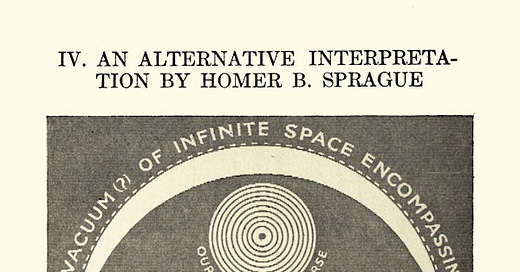



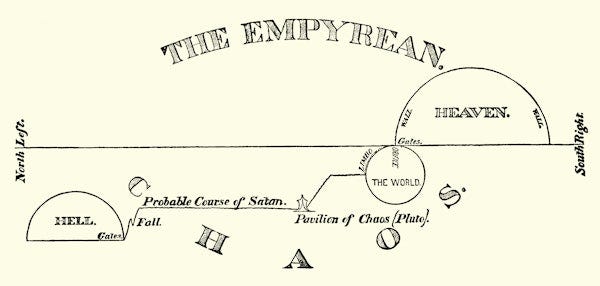

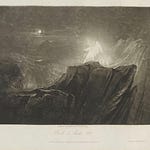
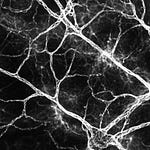
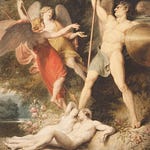


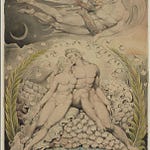
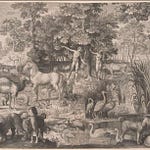
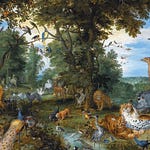
Share this post